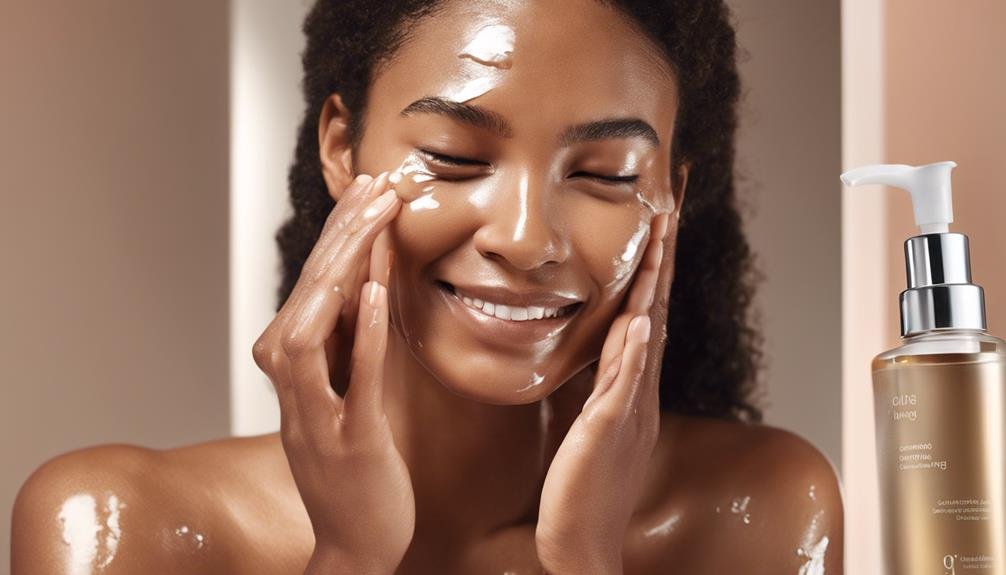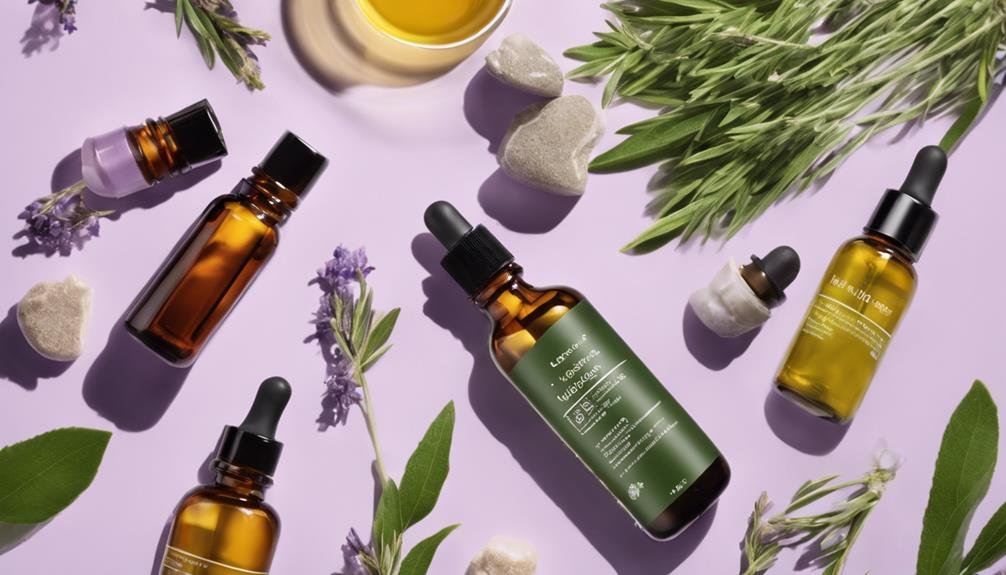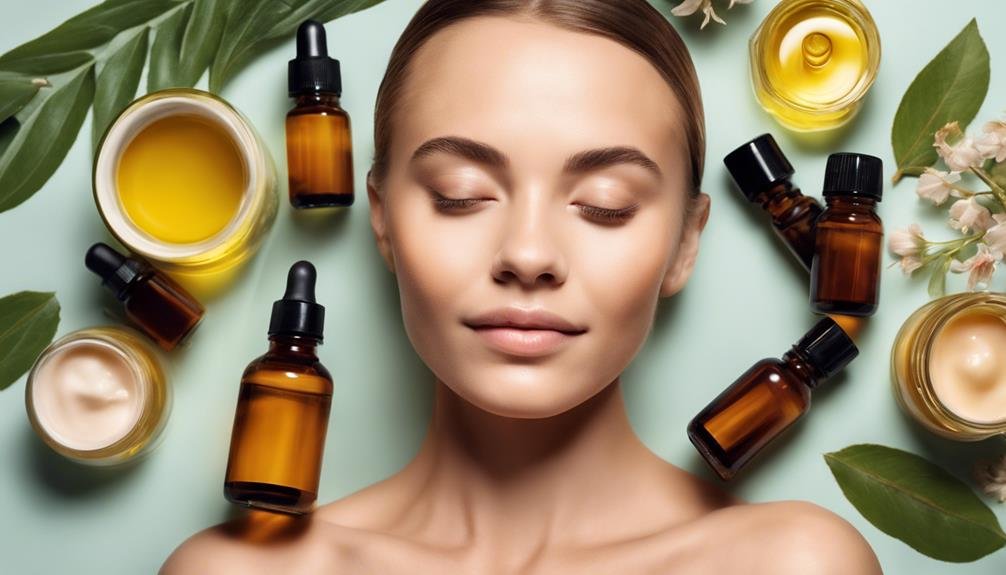If you're looking to enhance your skincare routine, did you know that cleansing oils have been found to boost skin hydration by up to 37% compared to traditional cleansers? This simple switch can make a significant difference in achieving a radiant complexion. By effectively removing impurities and providing essential nutrients, cleansing oils offer a gentle yet powerful way to nourish your skin from within. Learn more about how these oils can elevate your skincare game and help you achieve that coveted glow.
Key Takeaways
- Jojoba oil balances skin, promotes hydration for a radiant complexion.
- Rosehip oil boosts skin regeneration, aids in brightening for glow.
- Argan oil nourishes and moisturizes, enhancing skin's natural radiance.
- Use non-comedogenic oils to prevent clogged pores for a glowing look.
- Antioxidant-rich oils protect skin, promote healthy, glowing complexion.
Benefits of Cleansing Oils
When it comes to skincare, incorporating cleansing oils into your routine can offer a multitude of benefits for achieving radiant and healthy skin.
Cleansing oils work by dissolving makeup, dirt, and excess sebum on the skin's surface, making them effective in removing impurities without stripping away the skin's natural oils. These oils contain emollients and nourishing ingredients that help hydrate and maintain the skin's moisture barrier, preventing dehydration and promoting a supple complexion.
In addition to their cleansing properties, some oils possess antioxidant and anti-inflammatory properties, which can help protect the skin from environmental damage and soothe any irritation or redness.
Cleansing oils are suitable for all skin types, including oily and acne-prone skin, as they can help regulate oil production and prevent breakouts. Regular use of cleansing oils can improve the overall texture and appearance of your skin, leaving it soft, smooth, and glowing with health.
Incorporating a cleansing oil into your skincare routine can be a luxurious and effective way to pamper your skin while maintaining its health and vitality.
Types of Cleansing Oils
A variety of cleansing oils are available on the market, each formulated with specific ingredients tailored to different skincare needs. One common type is mineral oil, a lightweight and non-comedogenic option that effectively removes makeup and impurities.
Another popular choice is coconut oil, known for its moisturizing properties and ability to soothe sensitive skin.
Jojoba oil is a versatile option suitable for most skin types, as it closely resembles the skin's natural oils, making it an effective cleanser without clogging pores.
For those with acne-prone skin, tea tree oil is a beneficial choice due to its antibacterial properties that help combat breakouts.
Argan oil is rich in antioxidants and vitamins, making it ideal for nourishing and revitalizing dry or aging skin.
Rosehip oil is packed with essential fatty acids, promoting skin regeneration and improving overall skin texture.
Each type of cleansing oil offers unique benefits, so selecting the right one for your skin type is crucial for achieving radiant and healthy skin.
Choosing the Right Oil
Selecting the most suitable cleansing oil for your skin is essential for achieving optimal results in your skincare routine. When choosing a cleansing oil, consider your skin type.
For dry skin, opt for oils like almond, avocado, or olive oil, as they provide deep hydration.
If you have oily or acne-prone skin, consider lighter oils such as jojoba, grapeseed, or tea tree oil to avoid clogging pores.
Combination skin benefits from oils like argan or rosehip, which balance moisture levels without causing excess oiliness.
Sensitive skin types should look for gentle oils like chamomile or calendula to soothe irritation.
Additionally, check the ingredient list to ensure the oil is free from harsh chemicals or fragrances that could irritate your skin. Choose oils that are cold-pressed and organic for maximum effectiveness.
It's also important to consider the texture of the oil – thicker oils work well for removing heavy makeup, while lighter oils are suitable for daily cleansing.
How to Use Cleansing Oils
To effectively utilize cleansing oils in your skincare routine, it is crucial to understand the proper application technique for optimal results. When using cleansing oils, follow these steps for a thorough and effective cleansing process:
| Step | Instructions |
|---|---|
| Step 1 | Start with dry hands and a dry face. |
| Step 2 | Apply a generous amount of cleansing oil onto your skin. |
| Step 3 | Gently massage the oil into your skin in circular motions for about 1-2 minutes. |
| Step 4 | Add some water to emulsify the oil, continuing to massage for another minute. |
| Step 5 | Rinse thoroughly with lukewarm water and pat your skin dry with a clean towel. |
Following these steps will ensure that the cleansing oil effectively removes impurities and makeup without stripping your skin of its natural oils. By incorporating this technique into your skincare routine, you can achieve a radiant and healthy complexion.
Double Cleansing Method
To enhance the efficiency of your skincare routine and ensure thorough removal of impurities, the Double Cleansing Method involves using two cleansers consecutively. This method is particularly beneficial for individuals wearing makeup or sunscreen daily, as the first cleanse targets the removal of oil-based impurities like makeup, while the second cleanse focuses on water-based impurities such as sweat and dirt.
Begin with an oil-based cleanser to dissolve makeup, SPF, and excess sebum on the skin's surface. Massage the oil cleanser onto dry skin, allowing it to emulsify and lift impurities. Rinse with lukewarm water before proceeding to the second cleanse.
Follow up with a water-based cleanser to cleanse deeper into the pores, removing any remaining impurities without stripping the skin of its natural oils. This method ensures that your skin is thoroughly cleansed, prepped for subsequent skincare products, and maintains a healthy balance. Double cleansing can help prevent breakouts, improve skin texture, and promote a radiant complexion.
DIY Cleansing Oil Recipes
Enhancing your skincare routine with DIY cleansing oil recipes can offer a natural and effective way to maintain radiant, healthy skin. Creating your own cleansing oils allows you to tailor the ingredients to suit your skin's specific needs.
A simple yet nourishing DIY cleansing oil can be made by mixing olive oil with castor oil in a 1:1 ratio. Olive oil is rich in antioxidants and vitamin E, which help to hydrate and protect the skin, while castor oil is known for its deep cleansing properties.
For a soothing option, combine jojoba oil with sweet almond oil in equal parts. Jojoba oil closely resembles the skin's natural sebum, making it suitable for all skin types, while sweet almond oil is gentle and moisturizing.
These DIY cleansing oil recipes provide a luxurious and personalized way to cleanse your skin, leaving it glowing and refreshed.
Best Oils for Acne-prone Skin
For those with acne-prone skin, selecting the right oils for cleansing is crucial in managing breakouts and maintaining skin health. Opt for non-comedogenic oils that won't clog your pores, such as tea tree oil. Known for its antibacterial properties, tea tree oil can help combat acne-causing bacteria and reduce inflammation.
Another excellent option is jojoba oil, which closely resembles the skin's natural sebum and can help balance oil production. Jojoba oil is also rich in vitamins E and B, promoting skin repair and hydration.
Grapeseed oil is lightweight and absorbs quickly, making it suitable for acne-prone skin. It contains linoleic acid, which helps regulate sebum production and reduce the appearance of blemishes.
Lastly, consider lavender oil for its calming and soothing effects on irritated skin. When choosing oils for acne-prone skin, prioritize those with anti-inflammatory, antibacterial, and balancing properties to achieve clearer, healthier skin.
Oils for Hydration & Moisture
Navigating the realm of skincare oils, transitioning from addressing acne-prone skin to focusing on hydration and moisture infusions is a natural progression.
When seeking oils for hydration, opt for lightweight options such as argan oil, known for its ability to lock in moisture without clogging pores. This oil is rich in vitamin E and fatty acids, making it ideal for nourishing and hydrating the skin.
Another excellent choice is jojoba oil, which mimics the skin's natural oils, effectively hydrating without leaving a greasy residue.
For a surge of hydration, consider incorporating rosehip seed oil into your skincare routine. Packed with essential fatty acids and antioxidants, this oil aids in repairing the skin's natural barrier while providing deep hydration.
Antioxidant-rich Oils for Anti-aging
Antioxidant-rich oils play a crucial role in combating signs of aging by protecting the skin against free radicals and promoting collagen production. When it comes to anti-aging skincare, choosing oils rich in antioxidants can make a significant difference. These oils, such as rosehip seed oil, contain compounds like vitamin C and E, which help neutralize free radicals that contribute to premature aging.
By incorporating antioxidant-rich oils into your skincare routine, you provide your skin with the necessary tools to fight off environmental stressors and maintain a youthful appearance.
Rosehip seed oil, for example, is known for its ability to improve skin elasticity and firmness, reducing the appearance of wrinkles and fine lines.
Another powerful antioxidant oil is pomegranate seed oil, which not only helps protect the skin from UV damage but also aids in cell regeneration, promoting a more youthful complexion.
Cleansing Oils for Sensitive Skin
When dealing with sensitive skin, selecting the right cleansing oils is paramount to maintaining a balanced and gentle skincare routine. Opt for non-comedogenic oils like jojoba oil, known for its similarity to the skin's natural oils, making it gentle and less likely to cause irritation. Jojoba oil also helps to regulate sebum production, making it suitable for sensitive, oily, and combination skin types.
Another excellent choice is almond oil, which is rich in vitamins E and A, providing nourishment and hydration without clogging pores. It's soothing and helps calm inflammation, making it ideal for sensitive skin prone to redness or reactivity.
In addition, grapeseed oil is a lightweight option that won't leave a greasy residue, making it perfect for sensitive skin that's also acne-prone. It contains antioxidants that protect the skin from environmental stressors while providing moisture.
When choosing cleansing oils for sensitive skin, always opt for fragrance-free and hypoallergenic options to minimize the risk of irritation.
Oils for Brightening & Radiance
How can you achieve a luminous complexion that exudes radiance and brightness? When it comes to oils for brightening and radiance, selecting the right ingredients is key to unlocking your skin's true glow. Certain oils are rich in antioxidants and vitamins that help even out skin tone, reduce the appearance of dark spots, and impart a natural radiance. Here are some oils that can help you achieve that coveted luminous complexion:
- Rosehip Oil: Packed with vitamin C and fatty acids, rosehip oil brightens the skin, fades dark spots, and promotes a more even skin tone.
- Argan Oil: Known for its nourishing properties, argan oil is rich in antioxidants that help protect the skin from environmental stressors, resulting in a brighter complexion.
- Sea Buckthorn Oil: This oil is a powerhouse of vitamins and minerals that promote skin regeneration, enhance radiance, and improve overall skin health.
Incorporating these oils into your skincare routine can help you achieve a brighter, more radiant complexion.
Top Recommendations for Glowing Skin
Regularly incorporating key skincare products into your routine is essential for achieving a radiant and glowing complexion. When it comes to cleansing oils for glowing skin, there are a few top recommendations that can work wonders for your skin.
Look for oils containing ingredients like jojoba oil, which closely mimics the skin's natural oils, helping to balance and hydrate the skin.
Another excellent option is rosehip oil, rich in antioxidants and essential fatty acids that promote skin regeneration and brightening.
Additionally, consider incorporating argan oil into your skincare routine for its nourishing and moisturizing properties, leaving your skin with a healthy glow.
When selecting a cleansing oil, opt for products that are non-comedogenic to prevent clogged pores and breakouts.
Remember to perform a patch test before fully incorporating any new product into your routine to ensure compatibility with your skin.
With these top recommendations, you can achieve a luminous and radiant complexion that glows from within.
Frequently Asked Questions
Can Cleansing Oils Be Used to Remove Waterproof Makeup Effectively?
Yes, cleansing oils effectively remove waterproof makeup. The oil breaks down the makeup, allowing for easy removal. Gently massage the oil onto your skin, then rinse with water. Follow up with your regular cleanser for a thorough cleanse.
Are Cleansing Oils Suitable for All Skin Types, Including Oily Skin?
Yes, cleansing oils are suitable for all skin types, including oily skin. They effectively dissolve excess sebum and impurities without stripping the skin's natural oils. Incorporating a cleansing oil into your routine can help balance oil production and promote glowing skin.
Can Cleansing Oils Cause Breakouts or Clog Pores?
Yes, cleansing oils can cause breakouts or clog pores if not properly removed. They work by dissolving impurities, but residue left behind may lead to skin issues. Ensure thorough cleansing to prevent potential breakouts and pore blockages.
How Long Does It Typically Take to See Results From Using Cleansing Oils?
When using cleansing oils, results vary. Typically, noticeable changes in skin texture and radiance appear within a week or two. Consistency is key for optimal benefits. Stick with it, and you'll see the glow!
Can Cleansing Oils Help With Reducing the Appearance of Enlarged Pores?
Yes, cleansing oils can help reduce the appearance of enlarged pores by effectively dissolving excess sebum and impurities that can clog pores. Regular use can lead to a clearer complexion and minimized pore size over time.
Conclusion
In conclusion, incorporating cleansing oils into your skincare routine can help you achieve a glowing complexion. By choosing the right oil suited for your skin type and needs, you can effectively remove impurities and nourish your skin with essential nutrients. Remember to follow the double cleansing method to ensure a thorough cleanse. Embrace the radiance and rejuvenation that cleansing oils offer for a luminous, lovely glow.







